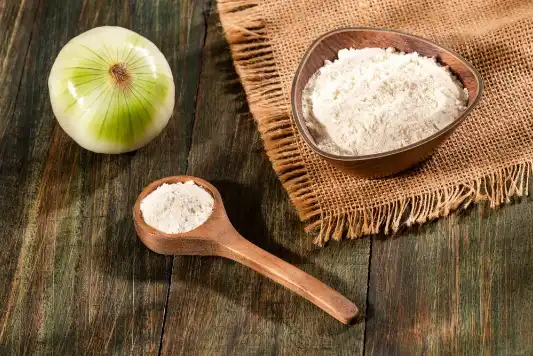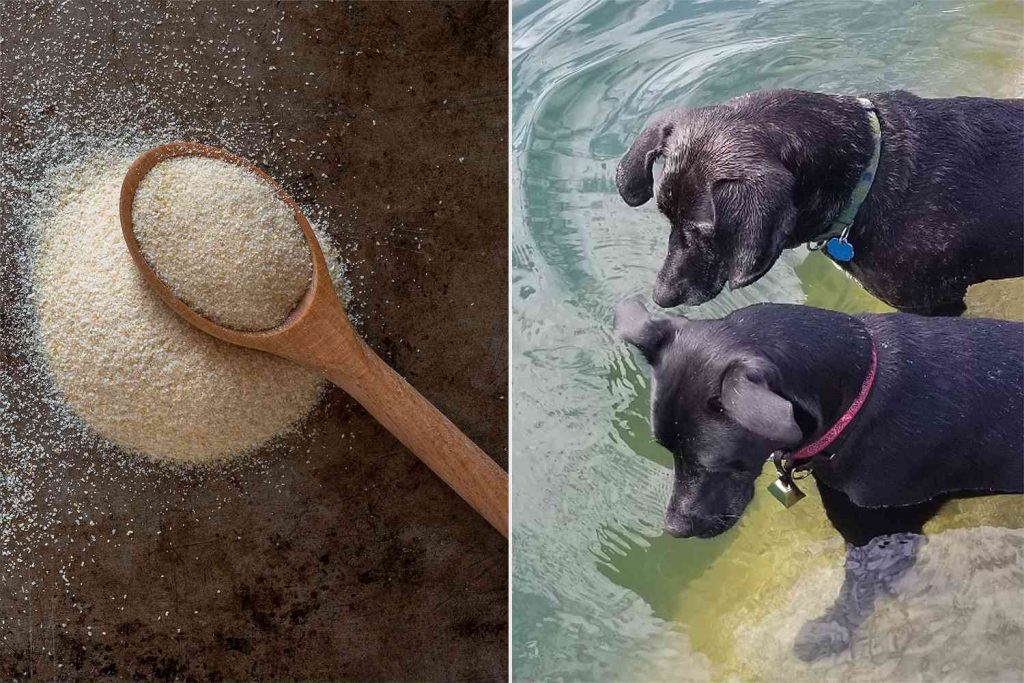Onion powder is toxic to dogs due to compounds that can harm red blood cells. It can be fatal.
Onion powder poses a serious health risk to dogs, leading to the destruction of red blood cells and potential fatality. This common kitchen ingredient, often found in various human foods, should be strictly avoided in any form when it comes to feeding your canine companion.
Dogs are highly sensitive to the toxic effects of onions, whether fresh, cooked, or in powdered form. Being aware of the dangers of onion powder and other allium family members like garlic is crucial to ensuring the well-being and safety of your beloved pet. Understanding the harmful consequences of these ingredients can help prevent accidental ingestion and subsequent health issues for your furry friend.

Credit: www.metlifepetinsurance.com
Introduction To Onion Powder And Canine Health
Onion powder is a common ingredient used in many food products, prized for its ability to add flavor and aroma to dishes. However, when it comes to canine health, onion powder can be toxic to dogs. In this blog post, we will explore the potential dangers of onion powder for dogs and provide essential information for pet owners to keep their furry friends safe.
What Is Onion Powder?
Onion powder is a dehydrated, ground form of onions that is commonly used as a seasoning in various culinary preparations. It is a convenient way to add the distinct flavor and aroma of onions to dishes without the need for chopping or slicing fresh onions.
Why Is It Used In Food Products?
Onion powder is used in food products for its ability to enhance flavor and provide a subtle onion taste without the texture of fresh onions. It is a popular ingredient in processed foods, seasoning blends, soups, and sauces due to its convenience and long shelf life.

Credit: www.petmd.com
Toxicity Of Onion Powder In Dogs
Onion powder, commonly found in various seasonings and food products, can be highly toxic to dogs. It contains compounds that can lead to severe health issues and even fatalities in canines.
Chemical Compounds In Onions
Onions contain N-propyl disulphide which is toxic to dogs. This compound can lead to the breakdown of red blood cells, causing anemia and potentially fatal consequences.
How Onion Powder Affects Canine Health
- Onion powder, like raw onions, can cause hemolytic anemia in dogs.
- The toxic compounds in onion powder damage red blood cells, leading to serious health issues.
- All parts of the onion plant, including the flesh, leaves, juice, and processed powders, are harmful to dogs.
Symptoms Of Onion Poisoning In Dogs
Onion powder is highly toxic to dogs, causing red blood cell destruction and anemia. Symptoms of onion poisoning in dogs include vomiting, diarrhea, weakness, and potential fatal outcomes. It’s crucial to avoid feeding any food containing onion powder to your furry friend to keep them safe and healthy.
Symptoms of Onion Poisoning in Dogs: Onion poisoning in dogs can have severe consequences if not treated in time. The symptoms of onion poisoning may not appear immediately and can take a few days to show up. It’s important to keep an eye out for any signs of toxicity if your dog has accidentally ingested onion powder or any other form of onion. Early signs of toxicity: The early signs of onion toxicity in dogs include vomiting, diarrhea, lethargy, and loss of appetite. These symptoms may seem mild at first but can quickly escalate to more severe signs of toxicity if left untreated. When to seek veterinary help: If your dog has ingested a significant amount of onion powder or any other form of onion, it’s important to seek veterinary help immediately. The veterinary doctor may induce vomiting to prevent further absorption of the toxin. In severe cases, hospitalization may be necessary to monitor the dog’s condition and provide supportive care. It’s important to note that onion poisoning can cause damage to a dog’s red blood cells, leading to anemia. This can result in symptoms such as pale gums, weakness, and difficulty breathing. In extreme cases, onion poisoning can be fatal for dogs. In conclusion, it’s crucial to keep onions and all forms of onion away from dogs, as they are highly toxic to them. If you suspect that your dog has ingested any form of onion, it’s important to seek veterinary help immediately to prevent any potential harm.
Credit: m.facebook.com
Case Studies And Reports
Documented incidents of onion powder poisoning have raised concerns about the potential risks for dogs. The ingestion of onion powder can lead to detrimental health effects, including the breakdown of red blood cells and the development of anemia in dogs. Veterinary insights on recent cases shed light on the severity of onion powder toxicity and the importance of awareness and prevention.
Documented Incidents Of Onion Powder Poisoning
Several documented incidents have highlighted the dangers of onion powder ingestion in dogs. In one case, a dog experienced symptoms of weakness, vomiting, and pale gums after consuming a small amount of food containing onion powder. Upon examination, the dog was diagnosed with hemolytic anemia, a serious condition resulting from the toxic effects of onion powder.
In another reported incident, a dog exhibited signs of lethargy, disorientation, and decreased appetite after consuming a meal seasoned with onion powder. The dog’s condition rapidly deteriorated, leading to the need for intensive veterinary treatment to address the severe effects of onion powder toxicity.
Veterinary Insights On Recent Cases
Veterinary professionals have emphasized the critical need for pet owners to be aware of the risks associated with onion powder and other allium species, such as onions and garlic. Recent cases have underscored the potential for rapid and severe health complications in dogs exposed to even small quantities of onion powder.
Furthermore, veterinarians have stressed the importance of prompt medical intervention and supportive care for dogs affected by onion powder toxicity. Timely recognition of symptoms and immediate veterinary attention can significantly improve the prognosis for dogs exposed to onion powder, potentially preventing life-threatening consequences.
Safe Dietary Practices For Dogs
Onion powder is toxic to dogs as it contains a compound called N-propyl disulphide, which can lead to the breakdown of red blood cells and cause anemia. It is best to avoid feeding your dog any food containing onion powder to ensure their safety and well-being.
Dogs are beloved members of our families, and ensuring their safety and well-being is a top priority. This includes being mindful of their dietary needs and potential hazards. When it comes to feeding our furry friends, it’s essential to be aware of ingredients that may be harmful to them, such as onion powder.
Alternatives To Onion Powder In Dog Food
When selecting dog food and treats, it’s crucial to look for alternatives to onion powder to safeguard your pet’s health. Opt for products that are free from onion and garlic derivatives, as these can be harmful to dogs. Seek out natural flavorings and ingredients that are safe for canine consumption, such as:
- Fruit purees for natural sweetness
- Herbs like parsley and basil for added flavor
- Vegetables such as carrots and sweet potatoes for nutritional value
How To Read Pet Food Labels
Understanding how to read pet food labels is essential for ensuring that your dog’s diet is free from harmful ingredients like onion powder. When examining labels, pay close attention to the ingredients list and avoid products that contain any form of onion or garlic. Look for clear indications of natural, wholesome ingredients, and consider opting for organic and grain-free options to prioritize your dog’s well-being.
Preventive Measures And Treatment Options
Onion powder is toxic to dogs as it contains a compound called N-propyl disulphide, which can lead to the breakdown of red blood cells and cause anemia. It’s important to prevent dogs from consuming onions, whether raw, cooked, or in powdered form, as it can be fatal for them.
Treatment options for onion toxicity in dogs may include inducing vomiting, administering activated charcoal, and providing supportive care under the supervision of a veterinarian.
Preventive Measures and Treatment Options for Onion Powder Toxicity in Dogs Onion powder is a common ingredient in many human foods, but it can be toxic to dogs. If you suspect that your dog has ingested onion powder, it is essential to take the necessary preventive measures and seek treatment options immediately. In this post, we will discuss how to prevent onion poisoning in dogs and the treatment protocols for affected dogs.How To Prevent Onion Poisoning
The best way to prevent onion poisoning in dogs is to avoid feeding them any food that contains onion powder. It is also important to keep all human food out of reach of your dog. Here are some additional preventive measures to consider:- Read the labels of all dog food and treats carefully to ensure they do not contain onion powder.
- Keep all human food, including onion powder, out of reach of your dog.
- If you suspect that your dog has ingested onion powder, contact your veterinarian immediately.
- Do not give your dog any home-cooked meals that contain onion powder.
Treatment Protocols For Affected Dogs
If you suspect that your dog has ingested onion powder, take them to the veterinarian immediately. The veterinarian may induce vomiting to prevent further absorption of the toxin. They may also administer activated charcoal to help absorb any remaining toxins in the stomach. In severe cases, the veterinarian may recommend hospitalization for your dog. Your dog may need to receive intravenous fluids to treat dehydration, and they may need a blood transfusion to treat anemia. In conclusion, onion powder can be toxic to dogs, and it is essential to take preventive measures to avoid onion poisoning. If you suspect that your dog has ingested onion powder, seek treatment options immediately by contacting your veterinarian. Remember, prevention is always better than cure.Frequently Asked Questions
How Much Onion Powder Is Toxic To A Dog?
Onion powder is toxic to dogs in very small amounts due to a compound that can harm red blood cells.
Why Does Dog Food Have Onion Powder?
Onion powder is added to dog food for palatability and flavor enhancement. It improves taste and aroma for dogs.
Will A Little Bit Of Onion Hurt My Dog?
A little bit of onion can hurt your dog as it contains a compound toxic to them.
Can Dogs Have Broth With Onion Powder?
No, dogs should not have broth with onion powder as it is toxic and can harm them.
Is Onion Powder Toxic To Dogs?
Onion powder is toxic to dogs as it contains compounds that can lead to the breakdown of red blood cells, causing anemia and potentially being fatal.
Conclusion
Onion powder is toxic to dogs due to the compound N-propyl disulphide. It can lead to red blood cell breakdown, anemia, and even be fatal. It’s crucial to avoid feeding dogs any form of onion, including powder, to keep them safe and healthy.

